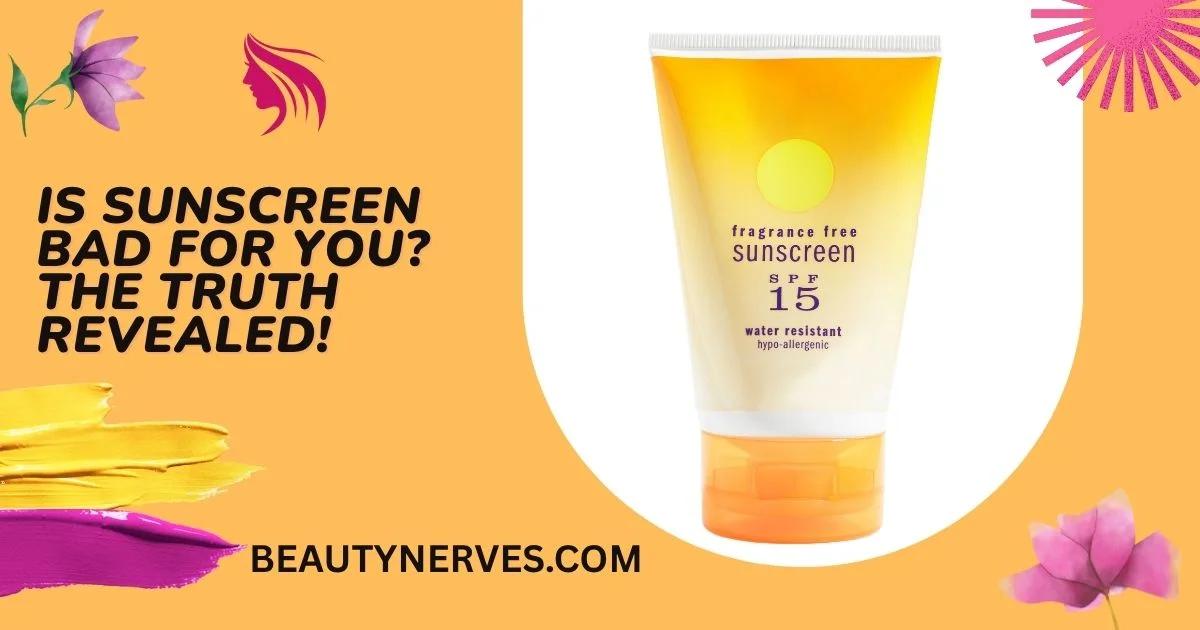Sunscreen is something I’ve used for years, convinced it was a must for protecting my skin. But recently, I started questioning whether it’s as harmless as we’ve been told. You’ve probably heard the rumors—some say it’s bad for your skin, others swear by it.
So, I decided to dig into the facts. Could sunscreen actually do more harm than good? Is it really safe for our faces and bodies in the long run?
After talking to experts and reading up on it, I’ve discovered some surprising answers. Let’s see what sunscreen is really doing to us.
Table of Contents
My Experience with Sunscreen: Is it Bad for You?
Sarah had been using sunscreen every day, thinking it was essential for protecting her skin from harmful UV rays. However, over time, she began to notice irritation and breakouts, something she’d never experienced before.
At first, she thought it was just her skin reacting to other factors, but when things got worse, she decided to visit a dermatologist. It turns out that choosing the right sunscreen is key.
Not all sunscreens work for everyone, and the wrong ingredients can do more harm than good. Is sunscreen bad for you? Sometimes, yes—if you don’t pick the right one.
The Burning Question: Is Sunscreen Bad for Your Face?
Sunscreen is crucial for protecting the delicate skin on your face. It shields you from harmful UV rays, which can cause wrinkles, dark spots, and even skin cancer. But, not all sunscreens are created equal, and certain ones can cause issues, especially for those with sensitive skin.
Some facial sunscreens contain ingredients that can clog pores, leading to breakouts or irritation. If you’re prone to acne, certain formulations might worsen the problem. Choosing the right sunscreen based on your skin type is essential. If you have oily skin, opt for a lightweight, non-comedogenic formula.
For dry skin, look for one that’s more hydrating. Not all sunscreens are bad for your face, but some may not suit your skin’s needs.
Dermatologists Weigh In: Is Sunscreen Bad for Your Skin?
When I asked my dermatologist about sunscreen, they emphasized its importance. Sunscreen is the best defense against UV radiation, preventing premature aging and skin damage. However, it’s not without risks.
Some sunscreens contain chemicals like oxybenzone, which have been linked to allergic reactions in some people. If you have sensitive skin, you might react to certain ingredients. The key is to choose sunscreens with safer, mineral-based ingredients like zinc oxide or titanium dioxide.
These are less likely to cause irritation or allergic reactions. So, while sunscreen is generally safe and beneficial, it’s important to pick the right type for your skin.
Can Sunscreen Cause Cancer? The Truth Revealed
The question of whether sunscreen can cause cancer has stirred up quite a bit of debate. Some people believe that certain chemicals in sunscreens, like oxybenzone, may be linked to cancer. However, most studies don’t support these claims. The Mayo Clinic reassures us that sunscreen is essential in preventing skin cancer, as it protects us from harmful UV radiation.
The truth is, many of the concerns around sunscreen chemicals are based on myths or incomplete research. While it’s true that some chemicals may irritate the skin, there is no solid evidence that sunscreen causes cancer. In fact, using sunscreen regularly is one of the best ways to prevent skin cancer in the long run.
The Benefits of Not Wearing Sunscreen: What Some Say
Some people argue that skipping sunscreen has its benefits, particularly when it comes to getting Vitamin D. The sun is a natural source of this essential vitamin, and by avoiding sunscreen, you can absorb more of it. However, the flip side is that unprotected sun exposure increases the risk of skin damage and premature aging.
Plus, some sunscreen ingredients, like oxybenzone, have raised concerns about their impact on the skin. While it’s important to enjoy the sun, skipping sunscreen regularly might do more harm than good in the long run.
List of Bad Sunscreens: Which Ones to Avoid?
When choosing sunscreen, it’s important to avoid certain harmful chemicals. Sunscreens containing oxybenzone or octinoxate should be avoided, as these ingredients can disrupt hormones and irritate the skin. Oxybenzone, in particular, has been flagged for its potential to absorb into the bloodstream, which raises concerns about long-term health effects.
Additionally, products with artificial fragrances or alcohols can dry out the skin and cause irritation. Always opt for sunscreens with safer, mineral-based ingredients like zinc oxide or titanium dioxide to avoid these risks.
“I Was Skeptical Too, Until I Tried the Best Sunscreen!”
Ryan was skeptical about sunscreen after reading so many mixed reviews. He wasn’t sure which one to trust for his sensitive skin. After a consultation with his dermatologist, Ryan found a sunscreen that worked wonders.
It protected his skin from harmful UV rays without causing irritation or breakouts. The best sunscreen, he learned, wasn’t just about protection—it was about choosing the right one for his skin type.
Long-Term Side Effects of Sunscreen: What You Need to Know
While sunscreen is crucial for protecting our skin, it’s important to be aware of potential long-term effects. Some studies suggest that certain sunscreen ingredients, like oxybenzone, could disrupt hormones and lead to allergic reactions.
Repeated use of sunscreens with these ingredients may cause irritation or even contribute to skin aging over time. Choosing sunscreens with safer, mineral-based ingredients can help reduce the risk of side effects. It’s essential to use products that are gentle on your skin while still offering protection from harmful UV rays.
Author

I'm Laura Anderson, and I love everything about beauty and fashion. I enjoy trying new makeup looks and learning fresh style tips. I'm always on the lookout for the next big trend. Dressing up and feeling good is my favorite thing!
View all posts



